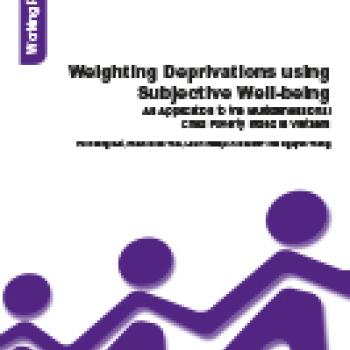Publication Information

Although multidimensional approaches to child poverty have received growing attention in Vietnam, proper investigation of how to assign weights to different dimensions when constructing single aggregation indices has not been done. Using Young Lives data, this study attempts to fill this gap by examining a weight estimation method which takes children's perspectives into account. This approach consists of computing analytical weights from estimated parameters of a subjective well-being regression model, where children's subjective well-being is explained by their outcomes/achievement in dimensions included in multidimensional poverty indices. This means that the resulting weights reflect the value judgements of children about what a good life is and that they are not based on a normative approach. Estimation results indicate that the revealed preferences of children change over time and vary across sub-groups of children. More importantly, this paper demonstrates that children do not give the same value to all dimensions, contrary to the assumptions underlying the most common approach to the calculation of weights that gives equal weight to each dimension. Children attach more importance to deprivations that impact their well-being immediately, such as deprivations in shelter and in water and sanitation, than to deprivations that may affect their well-being negatively in the long term, although some groups of children attach most importance to the dimension of education.

Although multidimensional approaches to child poverty have received growing attention in Vietnam, proper investigation of how to assign weights to different dimensions when constructing single aggregation indices has not been done. Using Young Lives data, this study attempts to fill this gap by examining a weight estimation method which takes children's perspectives into account. This approach consists of computing analytical weights from estimated parameters of a subjective well-being regression model, where children's subjective well-being is explained by their outcomes/achievement in dimensions included in multidimensional poverty indices. This means that the resulting weights reflect the value judgements of children about what a good life is and that they are not based on a normative approach. Estimation results indicate that the revealed preferences of children change over time and vary across sub-groups of children. More importantly, this paper demonstrates that children do not give the same value to all dimensions, contrary to the assumptions underlying the most common approach to the calculation of weights that gives equal weight to each dimension. Children attach more importance to deprivations that impact their well-being immediately, such as deprivations in shelter and in water and sanitation, than to deprivations that may affect their well-being negatively in the long term, although some groups of children attach most importance to the dimension of education.

